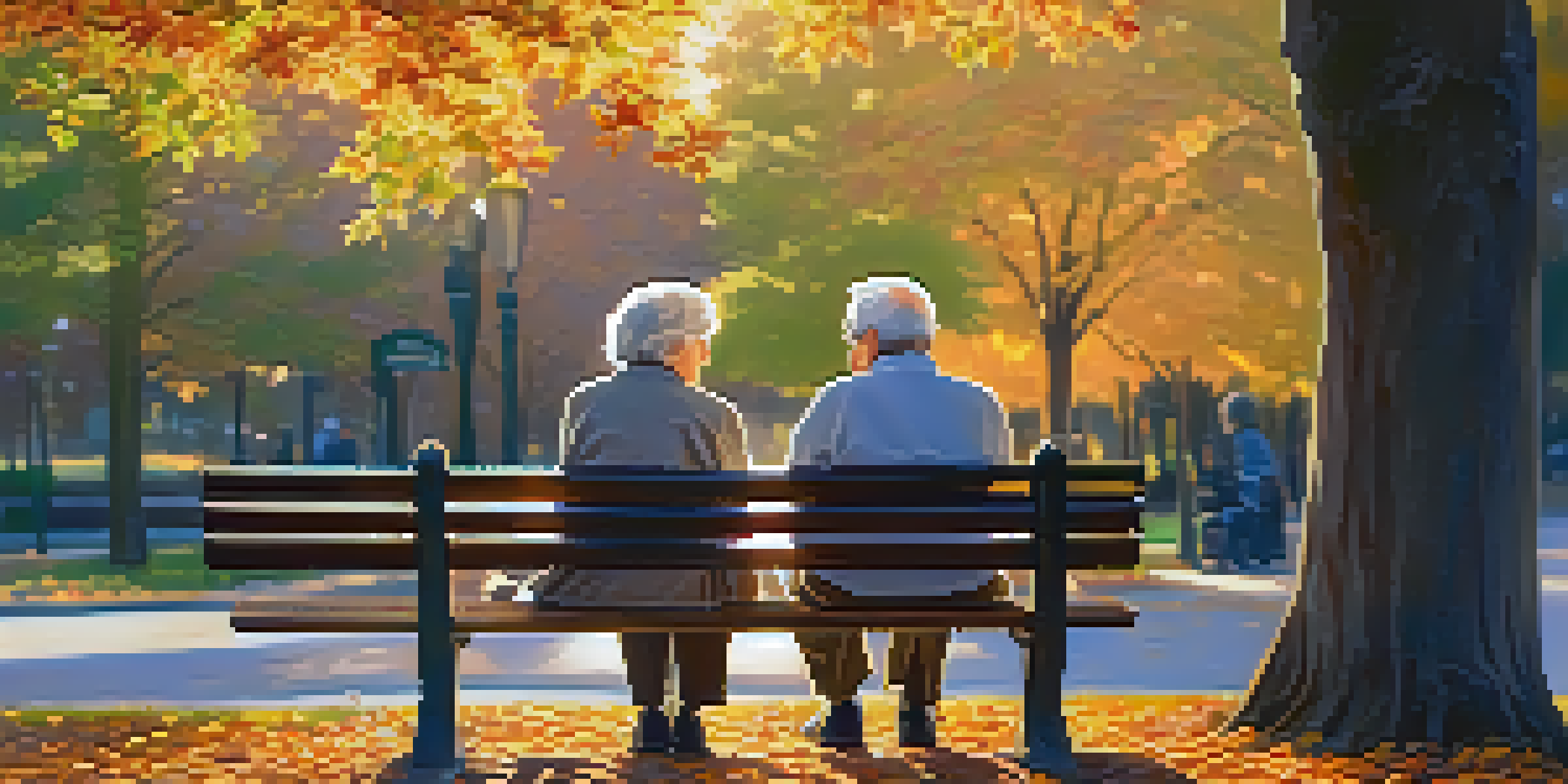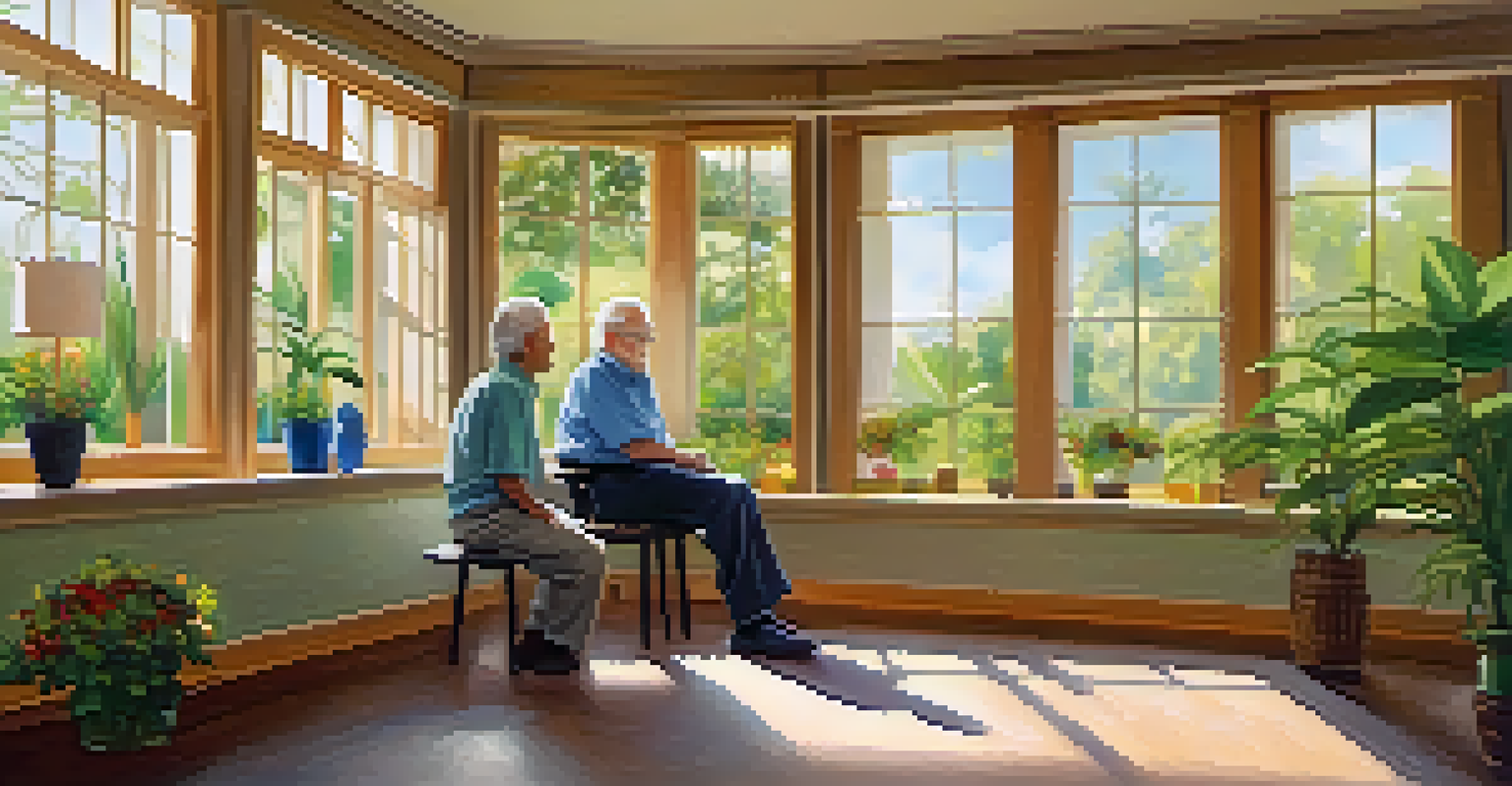Age-Related Anxiety: Can Hallucinogens Offer Relief?

Understanding Age-Related Anxiety and Its Impact
As we age, it's common to experience anxiety related to various life changes. This anxiety can stem from health concerns, loss of loved ones, or even the fear of losing independence. It's important to acknowledge how these feelings can significantly impact the quality of life for older adults.
Aging is not lost youth but a new stage of opportunity and strength.
Research indicates that anxiety disorders are prevalent among seniors, often leading to isolation and depression. Many older individuals might feel misunderstood or dismissed, which can exacerbate their anxiety. Understanding the nuances of age-related anxiety is crucial for addressing these feelings.
Recognizing and discussing anxiety openly can help break down stigma. By creating supportive environments where seniors can express their concerns, we can better understand what they face. This sets the stage for exploring potential solutions, including alternative treatments like hallucinogens.
Traditional Treatments for Anxiety in Older Adults
Typically, anxiety in older adults is treated with medications like antidepressants or anti-anxiety pills. While these can provide relief, they often come with side effects that can complicate matters. Understanding these traditional treatments lays the groundwork for considering alternative options.

Therapy, such as cognitive-behavioral therapy (CBT), is another common approach. It helps individuals reframe negative thoughts and develop coping strategies. However, access to therapy can be limited, leaving some seniors searching for additional relief methods.
Age-Related Anxiety is Common
Many older adults experience anxiety due to life changes, health concerns, and loss, significantly affecting their quality of life.
It's essential to explore the limitations of these conventional treatments. For many older adults, the side effects or the stigma surrounding mental health care can discourage them from seeking help. This is where alternative options, including hallucinogens, come into play.
What Are Hallucinogens and Their Historical Use?
Hallucinogens are substances that alter perception, mood, and various cognitive processes. Historically, they've been used in many cultures for spiritual and healing purposes. Understanding their background can help demystify their potential therapeutic roles today.
The greatest discovery of my generation is that a human being can alter his life by altering his attitude.
Examples of hallucinogens include psilocybin, found in certain mushrooms, and LSD, known for its profound effects. These substances have been studied for their potential to facilitate deep psychological insights and emotional healing. Their historical context provides a framework for discussing modern research.
In recent years, there has been a resurgence of interest in these substances for mental health treatment. This shift is largely due to promising studies showing their potential benefits. As we delve deeper, it’s vital to look at how these substances might help older adults facing anxiety.
Current Research on Hallucinogens and Anxiety Relief
Recent studies suggest that hallucinogens may offer significant relief for those suffering from anxiety, particularly among older adults. For example, research involving psilocybin has shown promising results in reducing anxiety levels. This gives hope to many who have struggled with traditional treatments.
These studies often focus on the experience of 'ego dissolution,' where individuals feel a disconnection from their anxieties and fears. This transformative experience can lead to lasting changes in perspective and emotional well-being. Understanding these mechanisms can highlight why hallucinogens might be effective.
Hallucinogens May Offer Relief
Recent research suggests that hallucinogens like psilocybin could provide significant anxiety relief for seniors, potentially transforming mental health treatment.
Moreover, the potential for these substances to promote neuroplasticity—the brain's ability to reorganize itself—could be particularly beneficial for older adults. This suggests that hallucinogens could help not just alleviate symptoms, but also foster long-term mental health improvements. It's an exciting area of study that merits further exploration.
Potential Benefits of Hallucinogens for Seniors
One of the most appealing aspects of hallucinogens is their potential to foster profound emotional healing. For older adults grappling with loss or existential concerns, these experiences can provide comfort and insight. This emotional support can be invaluable in navigating the challenges of aging.
Additionally, hallucinogens may help reduce the need for traditional medications, which can sometimes cause adverse side effects. The prospect of a more natural approach to anxiety management is appealing for many seniors who prioritize holistic health. This shift could lead to a more balanced approach to mental well-being.
Furthermore, the communal aspect of guided hallucinogen sessions can alleviate feelings of isolation. Participating in these experiences alongside others can foster connection and shared understanding, which is vital for improving mental health. This sense of community can be as healing as the substance itself.
Challenges and Considerations in Using Hallucinogens
Despite the promising potential, there are challenges to consider when exploring hallucinogens for anxiety relief. Legal restrictions in many areas can limit access to these substances, making it difficult for seniors to obtain them safely. Understanding the legal landscape is crucial for any potential treatment plan.
Moreover, the environment in which hallucinogens are consumed matters significantly. A safe, supportive setting is crucial to ensure a positive experience. Seniors may need guidance from trained professionals to navigate these experiences effectively.
Challenges in Accessing Treatments
Despite their potential benefits, legal restrictions and individual health considerations pose challenges to the safe use of hallucinogens for anxiety relief.
Lastly, individual health conditions must be considered. Seniors often have unique medical needs, so it's essential to consult with healthcare providers before exploring hallucinogens. This ensures that any potential risks are managed and that the approach is tailored to each individual's situation.
The Future of Hallucinogens in Mental Health Treatment
As research continues to unfold, the future of hallucinogens in treating anxiety appears promising. Ongoing studies will help clarify their benefits and risks, paving the way for more informed decisions. The landscape of mental health treatment is evolving, and hallucinogens may play a pivotal role.
Incorporating hallucinogens into therapeutic practices could revolutionize how we approach anxiety in older adults. By combining traditional methods with innovative treatments, we can create a more comprehensive approach to mental health. This could lead to better outcomes and enhanced quality of life for seniors.

Ultimately, the conversation around hallucinogens needs to continue, keeping an open mind to their potential benefits. As society becomes more accepting of alternative therapies, we can explore ways to integrate them responsibly into mental health care. This holistic approach could be the key to alleviating age-related anxiety.